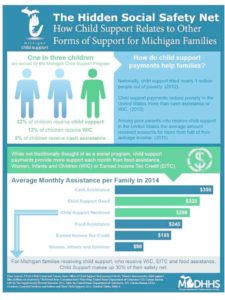Child Support

The Hidden Social Safety Net
ENFORCEMENT
The Child Support Enforcement Program was created under Title IV-D (Four D) of the Social Security Act. In Michigan, this program is administered by the Office of Child Support in cooperation with Friend of the Court Offices. The Office of Child Support is part of the Michigan Department of Human Services, and has the responsibility to administer Federal child support program funds, coordinate location of absent parents, and manage the process for income tax intercepts. The Office of Child Support may also initiate actions to have support orders entered under the Paternity Act or the Family Support Act, and to have support enforcement actions taken in another state.
INCOME WITHHOLDING AND 14 DAY NOTICE
Enforcement will automatically begin when support arrearages exceed the standard established by law. The delinquent payer will be notified that the arrearages have exceeded the standard and that enforcement will begin, including income withholding.
SHOW CAUSE HEARINGS
If income withholding is inappropriate or unsuccessful, an order to show cause hearing may be requested. The payer will be required to show cause why he/she should not be held in contempt for failure to comply with the court’s order. If the payer fails to appear, he/she may be found in contempt and a bench warrant may be issued for his/her arrest. If contempt is found, the court may apply any enforcement remedy allowed under law.
This matter will be heard before a referee; however, this matter may be taken before the judge for immediate hearing if necessary.
NOTE: Your driver’s, occupational, and recreational licenses may be suspended at this hearing if you fail to appear or to pay the arrearage in full.
NOTICE REGARDING HEARING: Each party attending the hearing must dress in a manner appropriate for a court hearing and must not carry any weapons into the courthouse or office of the friend of the court.
If you require special accommodations to use the court because of a disability, or if you require a foreign language interpreter to help you fully participate in court proceedings, please contact the court immediately to make arrangements. When contacting the court, provide your case number(s).
The payer MUST be at the hearing, unless other arrangements have been made. Both parties are encouraged to attend the show cause hearing. The custodial parent should appear to inform the Friend of the Court of the resources held by the paying parent and to assist in identifying and locating the paying parent. The custodial parent will receive a copy of all delinquency notices and hearing notices. Copies of notices will also be sent to the original attorneys of record prior to judgment. Either party may ask his/her attorney to accompany him/her to any hearing.
Once a bench warrant is issued, the duty to arrest usually lays with local law enforcement agencies. A bench warrant issued for failure to appear for a contempt of court hearing is only valid within the State of Michigan.
FEDERAL AND STATE TAX REFUND OFFSET
The Friend of the Court may collect past due support from Federal and State income tax refunds. There are current eligibility requirements that must be met for a case to be submitted for a tax offset. Based on the eligibility requirements, submission of arrearages is done automatically by the Office of Child Support.
LICENSE SUSPENSION
For payers with an arrearage of six or more months of support, the Friend of the Court may initiate action to have occupational, sporting, or drivers licenses suspended. A payer can avoid a license suspension by showing that there is a mistake regarding the amount of the arrearage or by entering into an agreement accepted by the court for the payment of the arrearage.
LIENS
A lien is a claim against real or personal property. Once a person holding property is informed of the lien, that person must not allow the property to be transferred until the lien is released. As of August 1998, Michigan law provides that a lien, for the past due support amount, exists against the support obligor’s real and personal property.
MEDICAL AND DENTAL BILLS
Health care insurance Michigan law provides that one or both parents shall obtain and maintain any health care coverage that is available to them at a reasonable cost, as the benefit of employment, for the benefit of the minor children of the parties. If a parent is self-employed and maintains health care coverage, the court must require the parent to obtain or maintain insurance coverage for the benefit of the minor children of the parties, if available at a reasonable cost.
Payment of health care expenses will be apportioned between the parents based on the percentage ratio indicated in their court order. Read your current court order carefully so that it is clear to you, which portion of the medical and dental expense is your responsibility and which portion is the responsibility of the other parent. Discuss with, or at least inform, the payer of the medical or dental services that must be performed, and attempt to work out a payment plan with the physician. Regardless of how the initial portions of health care expenses are to be paid, the office policy should be followed when submitting medical bills to the Friend of the Court Office.
Things You Should Know About the 2017 Michigan Child Support Formula
The Michigan Friend of the Court (FOC) Act (Public Act 294 of 1982) requires the State Court Administrative Office (SCAO) to develop “a formula to be used as a guideline in establishing and modifying a child support amount.” The SCAO developed its first formula in 1987. The most recent update takes effect January 1, 2017. Here are some things you should know about the formula. Any language appearing in italics below represents a major addition or change in the 2017 formula.
Two terms changed: “Extraordinary medical” is now “additional medical,” and “Third-party custodian” is “non-parent-custodian.”
Pro-rata share is a parent’s percentage of an expense and is determined by dividing that parent’s income by the parents’ combined family income.
Children-in-common are the children, under age 18, that the parents in the case have in common. The formula calculates support for all of the children to ensure support is available for each child while under age 18. A child over 18 may remain a part of the case if the child continues to reside with the support recipient full time, attends high school full time, and is eligible to graduate before age 19½.
Additional children are a parent’s biological or adopted children with someone other than the other parent in the case when the children reside with the parent or the parent pays support for the children through a court order. Step-children are not included. The process for considering additional children ensures support is provided for children when there are multiple cases.
A parenting time offset (PTO) eliminates “parenting time abatements” and “shared economic responsibility” in orders entered after October 1, 2008. A PTO allows the monthly “base support” amount to consider the time the children spend with each parent and to adjust support to reflect the shift in costs or the savings associated with the children’s overnights. Base support is the normal day-to-day costs for raising children, such as food, clothing, and shelter. While a PTO generally doesn’t apply if the children reside with a non-parent-custodian, the formula permits a deviation from the calculated amount if the children residing with a nonparent-custodian spend a significant number of overnights with the support payer that causes significant savings in the non-parent-custodian’s expenses.
An Annual Ordinary Medical (AOM) amount is included in every support order entered after October 1, 2004. An AOM is the amount anticipated to be spent on a child for uninsured medical during a calendar year and each parent is responsible for their pro-rata share. The support payer’s portion is added to the base support amount. The support recipient’s portion is covered by the payment of uninsured medical expenses as they occur, since he/she must pay all uninsured expenses that do not exceed the AOM amount. Once the support recipient has paid the full amount of the AOM, the support recipient may request reimbursement of qualified uninsured medical expenses through the Friend of the Court procedure. The 2017 formula increased AOM to $403 for one child, $807 for two, $1,210 for three, $1,614 for four and $2,017 for five or more children. AOM set in orders entered before January 1, 2017 will apply until modified.
Additional medical expenses consist of uninsured medical expenses that exceed the AOM amount. Additional expenses cannot be enforced by the FOC until the support recipient presents receipts showing he/she has spent the annual amount on AOM. A support recipient’s qualifying medical expenses include those paid with monies from a health savings account or flexible benefit account, provided that account is funded, in whole or in part, with monies reported as that individual’s income. All additional medical expenses, including those incurred by the payer, must be shared between the parents according to their pro-rata share.
Health care premiums are prorated based on the full cost of health care. Beginning in 2017, this will include health care premium coverage provided by step-parents for the children in the case in consideration. The formula determines each parent’s monthly premium attributable to the children by dividing the premium by the number of individuals covered (including the parent) and multiplying that number by the number of children in the case. That amount is then attributable to each party based on their pro-rata share. An addition to base support is made when the payer must pay more to cover the payer’s pro rata share of the premiums. A subtraction from base support is made when the payer is entitled to an offset so the support recipient pays his/her pro rata share of the premiums. The formula also gives a deduction for the portion of health care premiums that covers the parent as part of the mandatory provisions of the Affordable Health Care Act. The 2017 formula also increases the reasonable cost for providing health care coverage for the children from 5% to 6% of the providing parent’s gross income. Finally, the Court will no longer routinely require both parents to maintain coverage. The 2017 formula contains a process to determine which parent should maintain health care coverage.
Income calculations have been modified so that employer contributions to a retirement account; health savings account (HSA); and employer reimbursements for tuition, educational costs, and uniforms are not income. While a mandatory employee contribution towards retirement is an appropriate deduction from income, if an employee contributes more than the employer requires, that additional voluntary amount is income. For example, if the employer requires a minimum contribution of 2.5%, but the employee contributes 5%, then the excess of the mandatory amount, 2.5%, is included as part of the parent’s income.
Childcare charges must continue through August 31 following the child’s 12th birthday, unless special circumstances are provided for in a court order. The parties must notify each other if the childcare amount changes, and each other and the FOC when childcare stops.
The minimum threshold for arrearage payments is 2% of the total support arrearage at the time of the review, but no less than $50, nor more than 50% of the current monthly support amount.
To learn more about these and other 2017 formula changes, visit the SCAO website at http://courts.michigan.gov/.
MiChildSupport Calculator

Calculator
Use this link to access the public version of the MiChildSupport Calculator:
https://micase.state.mi.us/calculatorapp/public/welcome/load.html
The public Calculator was implemented in November 2015 to improve the overall efficiency and accuracy of calculating child support for IV-D workers. In August 2016, the public Calculator was released to provide the public with the ability to create a support calculation and help those most directly affected by the calculation to better understand and increase their confidence in the calculation results. Public users will obtain the same results from the public Calculator as IV-D workers who use the MiCSES* Calculator if both calculations use the same inputs.
The State Court Administrative Office has published the 2017 MCSF** Manual to replace the current 2013 MCSF Manual; however, it will not be effective until January 1, 2017. The 2017 MCSF and its supplement (MCSF-S) will be implemented in on December 2, 2016.
Both the MiCSES Calculator and public Calculator use the MCSF to calculate current child support amounts, which are then included within recommendations and orders. Because both versions calculate child support in accordance with the MCSF, both will be updated to reflect the changes made with the 2017 MCSF.
MiCSES* =Michigan Child Support Enforcement System
MCSF**=Michigan Child Support Formula
Please be advised of the current Friend of the Court policy regarding income:
2017 MCSF 2.01(G) Potential Income cites:
When a parent is voluntarily unemployed or underemployed, or has an unexercised ability to earn, income includes the potential income that parent could earn, subject to that parent’s actual ability.
To determine potential income, the following factors must be evaluated:
a. Prior employment experience and history, including reasons for any termination or changes in employment:
b. Educational level and any special skills or training:
c. Physical and mental disabilities that may affect a parent’s ability to work, or to obtain or maintain gainful employment:
d. Availability for work (exclude periods when a parent could not work or seek work, e.g., hospitalization, incarceration, debilitating illness, etc.):
e. Availability of opportunities to work in the local geographical area:
f. The prevailing wage rates and number of hours of available work in the local geographical area:
g. Diligence exercised in seeking appropriate employment:
h. Evidence that the parent in question is able to earn the imputed income:
i. Personal history, including present marital status, present means of support, criminal record, ability to drive, and access to transportation:
j. The presence of the parties’ children in the parent’s home and its impact on that parent’s earnings:
k. Whether there has been a significant reduction in income compared to the period that preceded the filing of the initial complaint or the motion for modification:
CHILD SUPPORT INFORMATION
Facts about the Michigan Child Support Formula
Allocation and Distribution of Support Payments
Understanding Child Support
MONITOR YOUR PAYMENTS 24/7
PAY YOUR CHILD SUPPORT ONLINE
DEBIT CARD HOTLINES
Are you experiencing problems with your child support debit card? Please contact one or both of the agencies below for resolution. The Friend of the Court does not have access to your debit card information.
- MiSDU Hotline: 877-543-2660
- Way2Go debit card: 844-649-9843

Policy for Reconciling Parties
Notice of Reconciliation
FORMS
HEALTHCARE REIMBURSEMENT PACKET
DISABILITY POLICY
REQUEST TO DISCHARGE STATE OWED DEBT
OBJECTION TO CHILD-SUPPORT REVIEW
NOTICE OF OBJECTION TO PROPOSED REDIRECTION OR ABATEMENT OF CHILD SUPPORT
FRIEND OF THE COURT – CASE QUESTIONNAIRE
CHILD-CARE VERIFICATION
POTENTIAL INCOME FACTOR QUESTIONNAIRE
Friend of the Court and Staff Attorney
Kyle J. Ortiz (P85887)
Office
870 S Main Street, Room 210
PO Box 70
Cheboygan, MI 49721
Email: foc@cheboygancounty.net
(231) 627-8825
Fax: (231) 627-8417
Hours
Monday – Friday
8:00 AM – 4:30 PM
Additional Staff
Custody/Parenting Time Investigator/Mediator
Breanne Thompson
bthompson@cheboygancounty.net
(231) 627-8418
Child Support Senior Case Manager
Mary Bur
mbur@cheboygancounty.net
(231) 627-8869
Child Support Senior Case Manager
Tracy Bourgeois
tracyb@cheboygancounty.net
(231) 627-8848
Child Support Case Manager
Cherry Ann Brandt
cbrandt@cheboygancounty.net
(231) 627-8826
Assistant to the Friend of the Court
Tina Stead
foc@cheboygancounty.net
(231) 627-8825
NON-EMERGENCY PUBLIC SAFETY NUMBERS
Cheboygan County Sheriff’s Office
County Building
870 S. Main St.
Cheboygan, MI 49721
231.627.3155
Michigan Department of Natural Resources
Indian River Field Office
6984 S. Straits Hwy
Indian River, MI 49749
231.238.9313
Cheboygan Department of Public Safety
Cheboygan City Hall
403 N. Huron St.
Cheboygan, MI 49721
231.627.4321
Mackinaw City Police Department
Village Hall
102 S. Huron Ave.
Mackinaw City, MI 49701
231.436.7861
Tuscarora Township Police Department
Tuscarora Township Hall
3546 S. Straits Hwy
Indian River, MI 49749
231.238.9481
Presque Isle County Sheriff’s Department
267 N 2nd St.
Rogers City, MI 49779
989-734-2156
CONTACT US
Cheboygan County
870 S. Main St.
Cheboygan, MI 49721
231.627.8855



